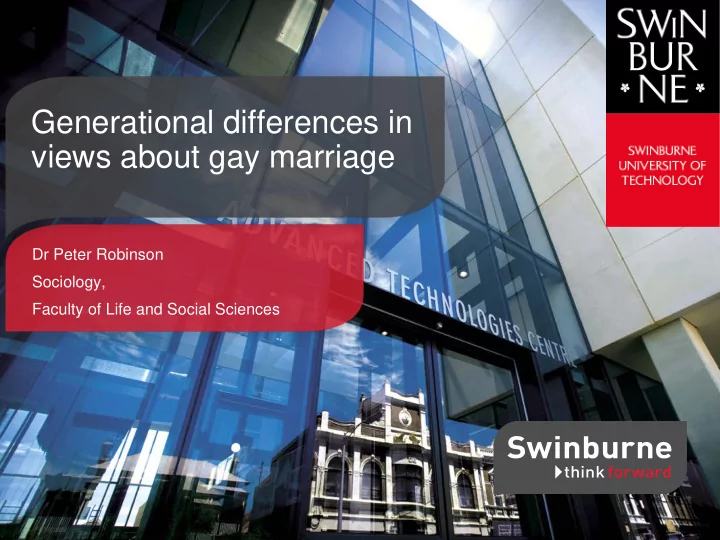

Generational differences in views about gay marriage Dr Peter Robinson Sociology, Faculty of Life and Social Sciences
Swinburne Background Gay Men’s Relationships Across the Life Course (Basingstoke and New York: Palgrave Macmillan, 2013) Research 2009–2011 - interviews with 97 men, aged 18–87 - nine cities, including Manchester, Melbourne, and Mumbai Original purpose: age and ageing Transformed, however, into book emphasizing age groups’ perspectives on relationships (e.g. long-term, singles, marriage) SCIENCE | TECHNOLOGY | INNOVATION | BUSINESS | DESIGN
Swinburne The data (1) Interviewees— recruited from nine cities: Auckland, Hong Kong, London, Los Angeles, Manchester, Melbourne, Mumbai, New York, and Sydney SCIENCE | TECHNOLOGY | INNOVATION | BUSINESS | DESIGN
Swinburne The data (2) Ethnicity: 30 (of 97) interviewees = non-Anglo Aboriginal (Mel), African-American (NY), Chinese (HK, LA) Maori (Auc), Mexican-American (HK), South Asian (Lon, Mum, Syd) Largest groups: South Asian (11) & Chinese (9), then: African-American=5; Maori=3; Aboriginal=1; Mexican- American=1 SCIENCE | TECHNOLOGY | INNOVATION | BUSINESS | DESIGN
Swinburne The data (3) Age cohorts— n =25 ( > 25%) Over 60 born 1949 & earlier n =41 ( > 40 %) 40–59 born 1950–70 39 & under n =31 ( < 33%) born 1971–91 Total n =97 SCIENCE | TECHNOLOGY | INNOVATION | BUSINESS | DESIGN
Swinburne The data (4) Social contexts— Over 60 s born 1949 & earlier, so most likely came out late 1960s, early 1970s 40–59 born 1950–70, so most likely came out mid-1970s, 1980s 18–39 born 1971–91, so most likely came out 1990s, 2000s SCIENCE | TECHNOLOGY | INNOVATION | BUSINESS | DESIGN
Swinburne Interviewing (1) Making contact: Most through personal introductions Auckland: academic connection Hong Kong: failure, then success Mumbai: PLWHA Vic to Naz Foundation London: Melbourne connections New York: Craigslist and serendipity Almost all face-to-face + 10 on Skype Transcription (digital recorder) then Microsoft Word SCIENCE | TECHNOLOGY | INNOVATION | BUSINESS | DESIGN
Swinburne Interviewing (2) Interview schedule: 2009 July/Aug New York, Los Angeles 2009 Dec Hong Kong, Mumbai 2010 Melbourne, Los Angeles (Skype) 2010 June London Manchester 2010 Oct Sydney, Auckland, Mumbai (Skype) 2010 Nov, Dec London (Skype) 2011 Melbourne 2011 June Hong Kong italics =repeat or follow up SCIENCE | TECHNOLOGY | INNOVATION | BUSINESS | DESIGN
Swinburne Findings (1) 62 men (c. 2/3rd of sample) favoured formal recognition of same-sex relationships o 42 pro gay marriage o 20 pro civil union but not gay marriage SCIENCE | TECHNOLOGY | INNOVATION | BUSINESS | DESIGN
Swinburne Findings (2) 42 men pro gay marriage and 20 men pro civil union only n =62 But, 23 men opposed legalising same-sex relationships and 12 men unsure SCIENCE | TECHNOLOGY | INNOVATION | BUSINESS | DESIGN
Swinburne Findings (3) Contrasting views on gay marriage did not split along lines of original age cohorts (over 60; 40–59; 18–39) but crossed boundaries Because those in favour of gay marriage were from within the young cohort (18–39) and those who opposed gay marriage drawn from middle and older cohorts (40–59 and 60+) SCIENCE | TECHNOLOGY | INNOVATION | BUSINESS | DESIGN
Swinburne Findings (4) Great majority of men 31 and under were pro gay marriage & for three reasons— Legal/property equality Relational equality White wedding: achievement/status marker (Cherlin, 2004) SCIENCE | TECHNOLOGY | INNOVATION | BUSINESS | DESIGN
Swinburne Findings (5) Less than half men aged 32–51 were pro gay marriage Like younger men, their reasons included— Legal/property equality Relational equality But, unlike younger men, they were Anti white wedding SCIENCE | TECHNOLOGY | INNOVATION | BUSINESS | DESIGN
Swinburne Findings (6) Majority of men aged 51–87 opposed gay marriage & for three reasons: Already had legal/property security Cohabitation was fine, had worked Fear it would upset existing relationship But, those who were in favour did so because: Memories of HIV-AIDS experience Continuation of gay liberation project SCIENCE | TECHNOLOGY | INNOVATION | BUSINESS | DESIGN
Swinburne Conclusion Dividing lines were strongly generational, that is, The majority of older men (51+) were anti gay marriage Almost all younger men (31& under) were pro gay marriage SCIENCE | TECHNOLOGY | INNOVATION | BUSINESS | DESIGN
Swinburne Some references Cherlin, Andrew (2004) ‘The Deinstitutionalization of American Marriage’, Journal of Marriage and Family 66: 848–861. Frew, Catherine (2010) ‘The social construction of same-sex marriage in Australia: implications for same-sex unions’, Law in Context 28(1): 78–91. Robinson, Peter (2013) Gay Men’s Relationships Across the Life Course , Basingstoke and New York: Palgrave Macmillan, pp. 100–44. Simmel, Georg (1999 [1895]) ‘On the sociology of the family’ trans. M. Ritter and D. Frisby, pp. 283–293 in M. Featherstone (ed.) Love and Eroticism . London: Sage Publications. SCIENCE | TECHNOLOGY | INNOVATION | BUSINESS | DESIGN
Recommend
More recommend